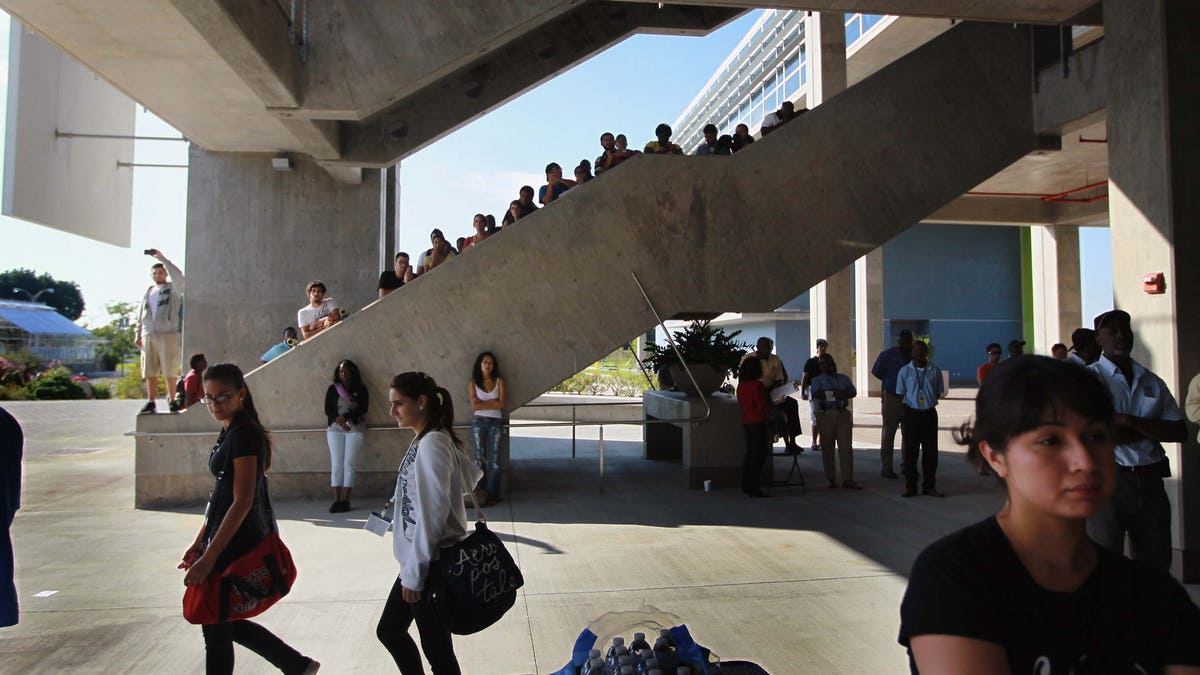
Students listen as former gubernatorial candidate Alex Sink speaks during a campaign event with former President Bill Clinton at Miami-Dade College October 21, 2010 in Miami, Florida. (Photo by Joe Raedle/Getty Images) (2010 Getty Images)
MIAMI – After months of unlimited fundraising and making speeches across the country like a guy running for president, Jeb Bush is reportedly making his candidacy official from a locale in Miami that represents his home city’s Latino diaspora.
On Monday afternoon, Bush will make his announcement from the Kendall campus of Miami Dade College, a school that boasts having the largest enrollment of minority students, mostly Latinos, than any other institution of higher learning in the U.S.
Friends and supporters say selecting Miami Dade enhances the former Florida governor’s positions on two issues, education and immigration, in which he veers away from the other Republican contenders, including his former ally, U.S. Sen. Marco Rubio.
"Governor Bush was brilliant to select Miami Dade College as his launch site," said Luis Gazitua, a Miami lawyer who is close friends with Bush’s sons. "Miami Dade is the largest and most diverse college in the nation. The student body represents the multiculturalism and entrepreneurial spirit of our nation’s next generation.”
Launching his campaign at the college helps emphasize Bush’s passion for education, a topic he’s raised often in stump speeches around the nation. At the same time, it will remind Latino voters that Bush – whose wife, Columba, was born in Mexico – is the lone Republican candidate who supports immigration reform that provides a path to legalized status for tens of thousands of undocumented migrants already in the U.S.
Part of Bush’s immigration platform promises to expand programs that allow immigrants to remain in the country for economic purposes.
Approximately 70 percent of Miami Dade College’s 165,000 students are Latino, yet the figure jumps to 78 percent at the Kendall campus, according to the school’s 2013-2014 annual student enrollment profile.
Most of those students are immigrants or the sons and daughters of immigrants, said Bob Martinez, a prominent Miami attorney who was appointed to the college’s board of directors by Bush when he was governor.
“Miami Dade College represents opportunity for everybody in the community,” said Martinez, who served on the board from 1999 to 2005. “When I was chairman, I believe the nationalities of the students was in excess of 100. They come from all over the world.”
According to Miami Dade’s annual enrollment profiles, 66 percent of the students identified as Latino were born in the U.S., 17 percent were born in Cuba and 11 percent were born in Colombia, Venezuela, Nicaragua and Peru.
Founded as a junior college in 1959, Miami Dade has morphed into the largest college in America under the 20-year tenure of President Eduardo Padron, an alumnus who eventually earned a doctorate in economics from the University of Florida. The school, which currently has eight campuses, became Florida’s first integrated community college during the 1970s when it enrolled African-American students and Cuban exiles who could not afford other schools. Today Miami Dade graduates more blacks and Latinos than any other institution of higher education, according to a college spokesman.
Barry Johnson, president and CEO of the Greater Miami Chamber of Commerce, said Padron has turned Miami Dade into a beacon, pointing the way to the American dream. Under Padron, the college began offering four-year degrees in 2003, is responsible for producing two-thirds of the nurses that work in Miami-area hospitals, and offers state-of-the art programs like new courses for training drone pilots, among other achievements, Johnson said.
“Miami Dade College is always looking forward,” Johnson said. “It’s all due to the vision and wisdom of Eduardo Padron.”
Martinez, who led George W. Bush’s legal team during the historic Florida recount of the 2000 presidential election, also credited Padron with positioning Miami Dade as a leading institute of higher learning.
“Eduardo and his team are never sitting on their butts,” Martinez said. “They are always on the cutting edge.”
The school has thrived despite ranking among the lowest in colleges that receive state aid, relying heavily on student tuition and other fees, as well as its private fundraising foundation, Johnson added. College officials have also been unsuccessful in getting the state legislature to allow residents in Miami-Dade County to vote on a half-cent tax increase to fund scholarships and future finances.
“Going to Tallahassee seeking funds is something the college is constantly dealing with,” Johnson said. “That is the challenge.”
Yet Miami Dade has built a reputation as a go-to stop in Miami for national politicians. In the past decade, the college has hosted Nancy Pelosi, Al Gore, Dick Cheney, Ralph Nader, Mitt Romney, Newt Gingrich, John McCain and Rick Santorum, to name a few. Presidents Barack Obama, George W. Bush, and Bill Clinton have given commencement addresses at the college.
And for the second time in the last three months, Miami Dade will be the site of a presidential candidate’s entry into the 2016 race. In April, Rubio announced his candidacy at the college-owned Freedom Tower, a historic building that served as a processing and assistance center for Cuban exiles in the 1960s.
“Jeb was spot-on picking Miami Dade College,” Martinez said. “It’s the perfect place.”




